by Wanda Sabir
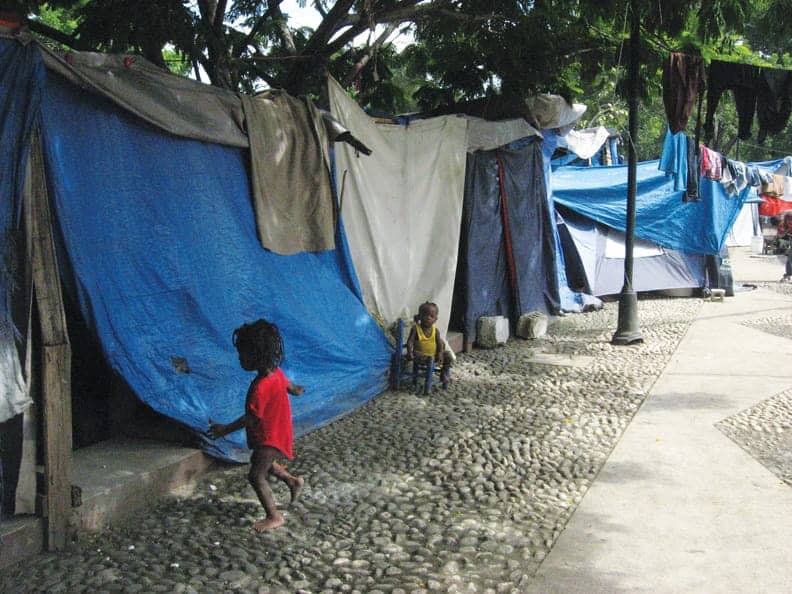
Little children make the best of growing up in a makeshift, post-earthquake camp in the huge city of Port au Prince, where nearly 2 million people have no real homes to live in. – Photo: Wanda Sabir
Daddy died this weekend – Saturday, Aug. 14, the anniversary of the Haitian revolution, Bwa Kayiman – and here I am in Delmas now with Rea Dol, principal of Sopudep School, and her family. I am so happy she picked me up first before she ran her errands. Her house is almost finished outside and inside it is a mansion – oh my goodness! I was sleeping on concrete at BAI (the human rights law office Bureau des Avocats Internationaux) for two days before Chris, an intern, let me sleep on his air mattress last night, and today I am in bed with a mosquito net – I have arrived!
We went to check on Rea’s account with a building supplier – Arnold Azolin, a Black man who lets the savvy business woman buy on credit when she doesn’t have the money up front. She is preparing to open the Sopudep School II site for the older kids in temporary classrooms made from bamboo this October and keep the younger children at the old site where some people are still living since the earthquake because of the shortage of shelter. Her family members, the larger two families, have their own places now and some of the younger people who were also camping here do as well.
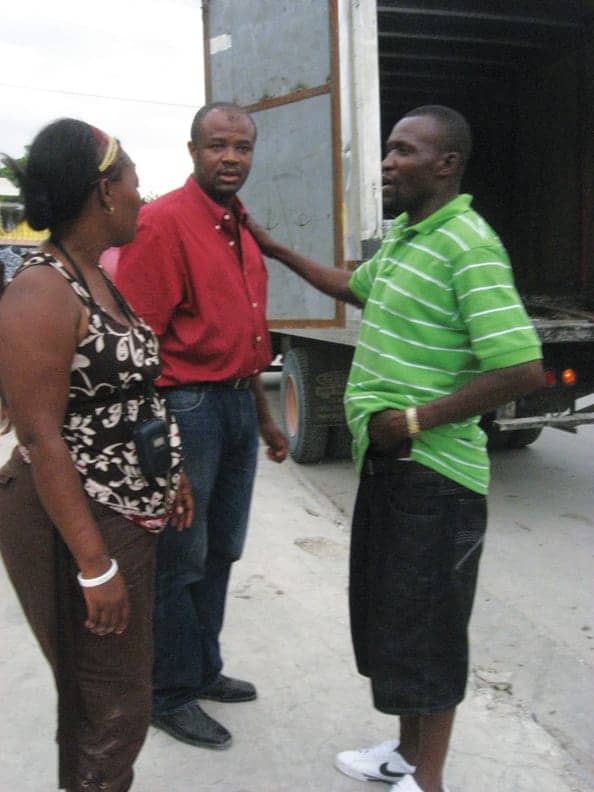
Rea Dol, principal of Sopudep School, and her husband, Bataille, right, talk with Arnold Azolin, the owner of a construction supply business who generously gives them credit. – Photo: Wanda Sabir
Rea is getting ready to adopt another child – a girl whose parents died during the earthquake. Her neighbor who has been keeping the child can’t feed her. The community also wants her to adopt an infant, but with her busy schedule, that would be rather impossible. Rea is also taking care of a neighbor who is so weak she can’t stand – she showed me a photo of the woman. Her legs are a thin as twigs. After taking her to the doctor, Rea said the diagnosis is starvation, the women just needs to eat, so Rea takes food by the neighbor’s house for the children to cook. One child dropped by the house this evening.
We stopped off at another supplier, a woman from whom Rea purchases beans and rice to feed the hungry children in the neighborhood where Sopudep I is. After she found out why Rea was buying beans and rice, she told her she would extend credit to her as well. Rea stopped by to pay her, and the woman didn’t want to take her money. I love the cooperative economics employed here – dollars circulating in the Black community, turning over again and again: Ujamaa at work!
The last stop was the grocery store where we got sodas and water. The bill was 129.00 gouds I thought, but I paid with two 500.00 goud notes. The change was 200.00. Yes. I am confused. I have to figure out what that means in Haitian dollars.
Today was a long one. I visited three Internally Displaced Persons (IDP) camps this morning and afternoon. Chris, intern at the Bureau des Avocats Internationaux (BAI) and interpreter, and I walked downtown with Gisele, one of the camp leaders, who introduced us to women who’d all suffered sexual violence – from the young girls barely out of their teens to their mothers and grandmothers, who often suffered such violence as well.
When one thinks about generational traits, rape is not one that comes to mind, yet those women who speak up like Malya A. Villard, secretary of KOFAVIV, and Marie Eramithe, two women I met who lead KOFAVIV: Komisyon Fanm Viktim pou Viktim, and young girls and other women are targeted because they don’t have anyone to protect them, which is certainly the case in many of these women’s lives since the earthquake in January. Rape is becoming normalized. Visit http://ijdh.org/projects/rapp.
Women have been beaten and raped, often brutally, sometimes by multiple attackers, as a warning to stop being politically active. In many cases, women become pregnant and, as abortion is illegal and women can be incarcerated, these women are left with a living breathing reminder of the trauma. Most women cannot hold a job if they are the leaders and they need protection getting to and from their tents.
Women have been beaten and raped, often brutally, sometimes by multiple attackers, as a warning to stop being politically active.
BAI offers this kind of support and there is even an advocate on board, Jocie Philistin, who is also an evangelist, prison and human rights advocate and coordinator of YAHVE RAPHA Foundation and herself a victim of rape by Haitian military. Philistin and Villard’s stories show how rape as a weapon of war is not recent – however, the recent events post-earthquake have highlighted a renewal of these crimes against women and girls – Villard raped again this year.
Both Mrs. Villard and Mrs. Eramithe have children, two sons at university. One son writes:
“I’m Saint Quitte Yvens, the son of Mary Delva Eramithe, a victim who has been raped since 1992 by armed police had entered the door of his house with his force power and violated fight my father. After this incident, my father suffers from a disease that eats away at his body and caused his death in 1999.
“My mother has seven children and I am the eldest of the family. I am in second year Computer Science, third year this year. To achieve this level, I really suffer. My father was everything to the family, my mother does nothing [does not have a job]. After the death of my father, I thought there was no life for my family because I do not see how we were eating, housed and educated. My mother has no economic means, but thanks to [her] intelligence, [her] courage and determination, she did everything she could to educate his children.
“I finished my classical studies since 2005, lack of economic means, my mother could not help me to attend a university. I was forced to spend three years doing nothing. About the year 2007, my mother collected everything she had and ready to make some friends specially for my university studies, she had to spend a whole year to see how she could send me to university in 2008.
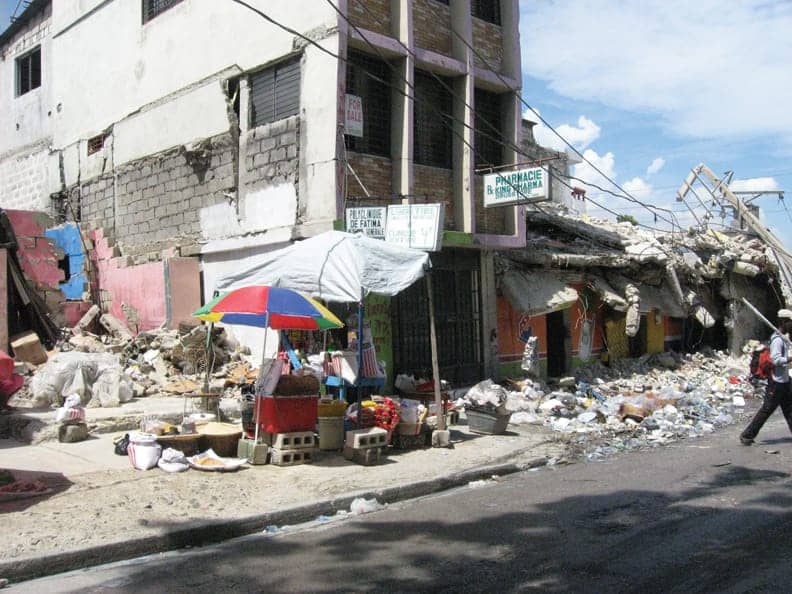
Buildings that collapsed during the earthquake haven’t been removed and more are still collapsing eight months later. A building collapsed while I was in Haiti. Luckily, no one was injured. Much of the debris has yet to be cleared away and cleaned up. Yet the people still conduct business to survive. – Photo: Wanda Sabir
“In Haiti, education is very expensive. To pay for a university it costs a lot. Mom did everything she could to pay the two years previous shows, this year the money is really difficult and even impossible for him. I may lose this year because she cannot do anything for me.
“I would like continue my studies, because it is the only way that could give me the same opportunity to help myself and my family. I said thanks for your assistance in helping young scholars to continue his studies and I never cease to thank you for everything you [can do] for me.” To reach the mothers and find out how you can assist Saint Quitte and Mrs. Villard’s university enrolled sons, contact Jocie Philistin at pjocie@hotmail.com. I suggest going through the organization BAI.
BAI intern Christopher Eves, who is completing a masters in social work in Chicago, translated for me and filled in missing information when requested Saturday, Aug. 14, as we visited the camps. Afterwards, I wanted to visit the National Museum, so we took a taptap downtown, but it was closed – it has been closed since January. So we’re strolling towards an artist marketplace and Chris runs into a friend who invited us to visit his home across from the French Embassy, which is gated. We could see the official looking building from afar.
These IDPs seemed to have a better situation than those I’d met in the morning, who are mostly women – all the ones I met victims of sexual violence. At Place des Artistes, where artist Jude Jean Pierre, Chris’s friend, stays, men patrol the camp and even resolve disputes, which I witnessed as we were departing. Jude pulled one of the young men away from the other. There is a camp director, a position Williams James Marc Else fell into after the earthquake when so many people found themselves displaced.
I guess the similarities and differences in camps can be equated with degrees of heat in hell – Dante’s inferno. One woman in the second camp had a tin roof, so at the time we visited it was almost unbearably hot, the roof cooking the interior, but there were no leaks so unlike others nearby, when it rained the family didn’t have to awaken drenched and then stay wet the rest of the night. The rugs which covered a dirt surface below, however, would get wet – clothes, bedding – and if unable to adequately dry would get molded.
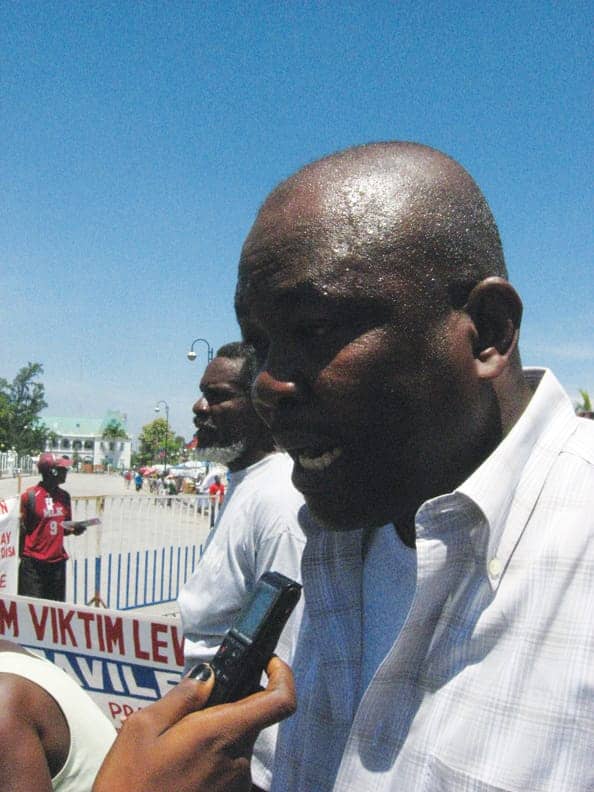
Mario Joseph, director of the Bureau des Avocats Internationaux (BAI), is the hub of human rights defense in Haiti. – Photo: Wanda Sabir
Williams and Jude are both members of the organization that meets at BAI. It seemed that if anything was happening in Port au Prince around policies or policy development, it was connected to Mario Joseph’s BAI. It was great to be situated in the progressive nexus – too bad I didn’t fully comprehend the extent of all the activities like the eight of so men and women who filed down the hall into human rights attorney and BAI director Mario Joseph’s office to change as I was leaving Aug. 14. Several well-dressed men came back with Mario from a funeral – I presume of an important person in the community. Delourdes mentioned she was attending a funeral and Mario hadn’t seen her, so it must have been huge.
All of the IDP camps in the capital are called collectively Champ de Mars. One doesn’t wander through the camp unescorted – it is a “gated community” (smile). Unfortunately, the resources don’t seem able to get into each of the sites equally. Chris said the camp dwellers don’t control who gets the mobile health unit, which one has a school, who has childcare or preschool. But in Pétion – the camp right behind the Palace with a fountain which used to work – the space is densely populated with not much room to move around – tents and people literally on top of one another.
I wish I’d had a before and after image of the earthquake damaged areas.
It’s sort of how people feel about New Orleans, pre- and post-Katrina, now pre- and post-BP spill. The polluted shoreline, the displaced and destroyed natural habitats and their inhabitants – birds, fishes, plant life and of course human beings – the cultural decimation is irreplaceable, its cumulative impact impossible to calculate.
It is the same here in Haiti. With the timing of the election and the vote just two months away, one wonders what is in store for this tiny country with major karma in opposition to the lives and well-being of people, African people who just want to be left alone to live – really live.
Maafa Hurricane Katrina’s Fifth Anniversary
Speaking of Katrina and the fifth anniversary, Sunday, Aug. 29, also the birthday of the late Michael Jackson. Listen to Wanda’s Picks Special on Katrina Five Years Later: www.blogtalkradio.com/wandas-picks. I interview Ms. Diane Evans, who with her grandson is about to be evicted from her home this month, September. She needs $1,900 to stay. Call her at (415) 786-4773 or email dianeevans504@gmail.com.
Maafa Awareness Month is next month. The 14th Annual Maafa Ritual is Sunday, Oct. 10, 2010, predawn. Visit www.maafasfbayarea.com for the specifics, also for related events and activities, or call (641) 715-3900, ext. 36800#.
Intensifying the pain in Haiti
There was high unemployment for Haitians, those educated with skills and the unskilled as well, prior to the earthquake. For a government official to tell a BAI representative that withholding food was a way to motivate lazy people looking for a handout to get to work is a gross misread of the problem. Since when is physical hunger a motivation when hunger is not anything new to Haitians who have had to deal with food insecurity for as long as President Aristide’s programs were effectively shut down?
For a government official to tell a BAI representative that withholding food was a way to motivate lazy people looking for a handout to get to work is a gross misread of the problem.
Although Wyclef Jean doesn’t have a clue on how to run a country, some feel that he is interesting Haitian youth in the electoral process for the first time because of his interest in running for president. It’s great he is proud of his Haitian heritage but it’s like a person who has been passing for white all of a sudden claiming his or her African ancestry for an associated perk.
I don’t see any evidence of relief for any of those people I met who spoke to me Saturday in the camps. One young mother said she was happy to see visitors but although many people come through, nothing follows.
Can you imagine being homeless in a displaced persons’ camp? Kind of hard, right? Definitely, but I met a grandmother who doesn’t have a bed and sometimes when she wakes up she can barely move. I knew exactly what she meant, having spent two days on the ground myself. I also met a woman who has several children who also needs a place for her children. Gisele, who was our tour guide, had to send her children away because it was too dangerous for them at the camp – their mother with a contract on her head.
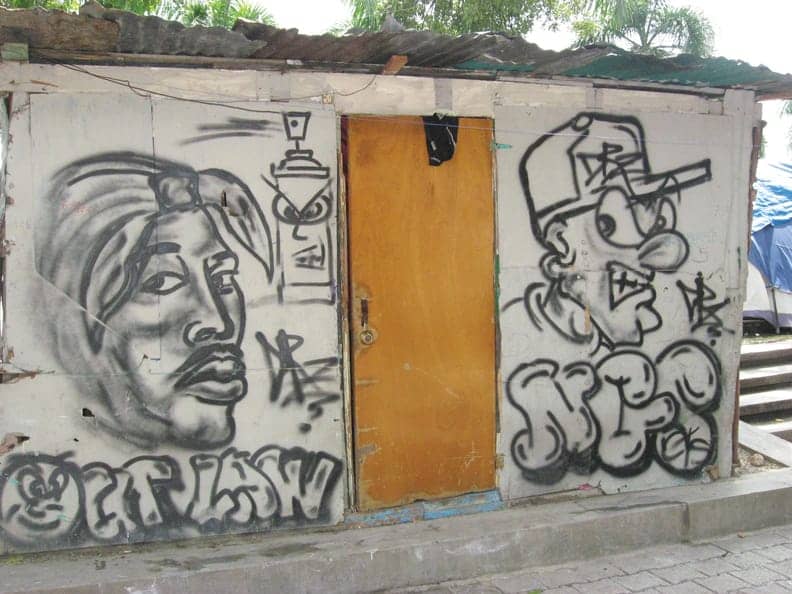
A temporary camp dwelling, studier than most, is decorated with a drawing of Tupac. – Photo: Wanda Sabir
Women wore their badges with whistles attached. I asked one woman to let me hear it. When blown a certain way, help comes – if it is within earshot.
Jude is also an artist – a painter – and when I met him he’d made some brew – green with ginger sediment at the bottom of a glass bottle the size of a fifth. He explained that there were different flavors which had certain properties when ingested. Chris and I walked through an artists’ village area, which reminded me of the Ashby Flea Market, just fewer items and variety. An artist wanted to sell me a painting on a canvas for just 500 goud, but I wasn’t feeling it. None of the art spoke to me; it was “I Love Haiti” key chains and bracelets and necklaces.
I saw a couple of elderly women begging and a clearly deranged man – he was so dirty his skin looked like it was covered in charcoal. If I wasn’t feeling so skittish, I would have given the women and the man an offering, but I didn’t have the money in my pocket ready to pull out. With the money belt under my top around my waist tucked into my waist band – my passport getting a steam bath daily as I heated up, my waist pack on the outside with less money inside a baggie, my tape recorder, FLIP inside, my glasses case hooked to the fanny pack, and then my camera around my neck. I even had my TJ (Trader Joe’s) bag full of kids’ supplies.
However, when I saw the older women and the man who looked like he needed a medical intervention – well, to reach the money would have been a major task. On Sunday at a fast food restaurant, I was able to give a mother standing in the rain with a babe in arms and one standing next to her a little something. Rea had picked up Pastor Wilbur Blanc, now living in Oregon, with a friend of his. Pastor Blanc hadn’t been to Haiti since the earthquake and he wanted a tour.
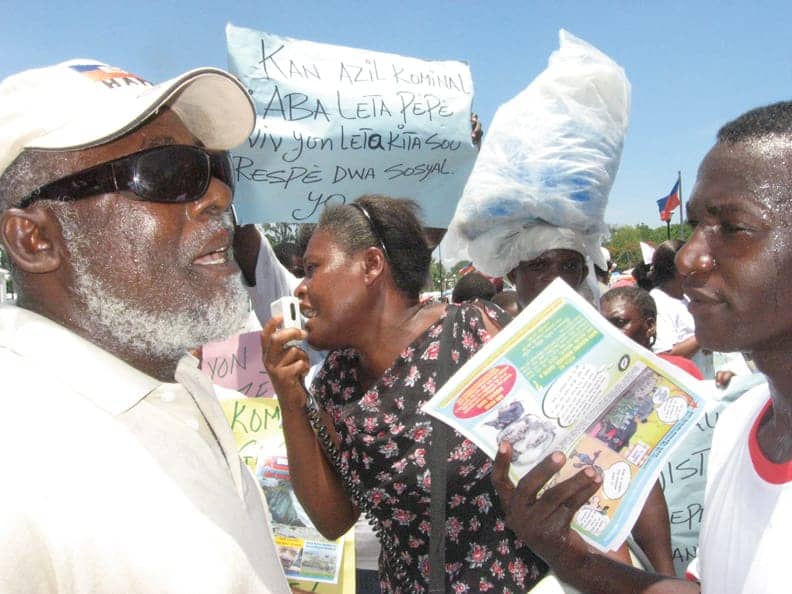
Comic books and leaflets explaining people’s rights were passed out at the protest march Aug. 12. – Photo: Wanda Sabir
When I arrived in Haiti a few days earlier, it was raining hard. This wet weather is new for this time of year, Rea said, just a sign of the natural environment’s instability since the earthquake. I’d been traveling for two days: left San Francisco Tuesday early (12:30 a.m.), an hour late, and subsequently missed my flight from Miami to Port au Prince (PAP).
The day after I arrived, the organization where I was staying, Bureau des Avocats Internationaux (BAI), was preparing for two demonstrations: one to protest the eviction of Internally Displaced Persons and the other the third anniversary of Lovinsky Pierre-Antoine’s disappearance. Visit http://ijdh.org/. Lovinsky founded the Fondasyon Trant Septanm (September 30th Foundation) that works with the victims of the coup d’états of 1991 and 2004. Visit http://www.haitiaction.net/News/HIP/2_18_7/2_18_7.html.
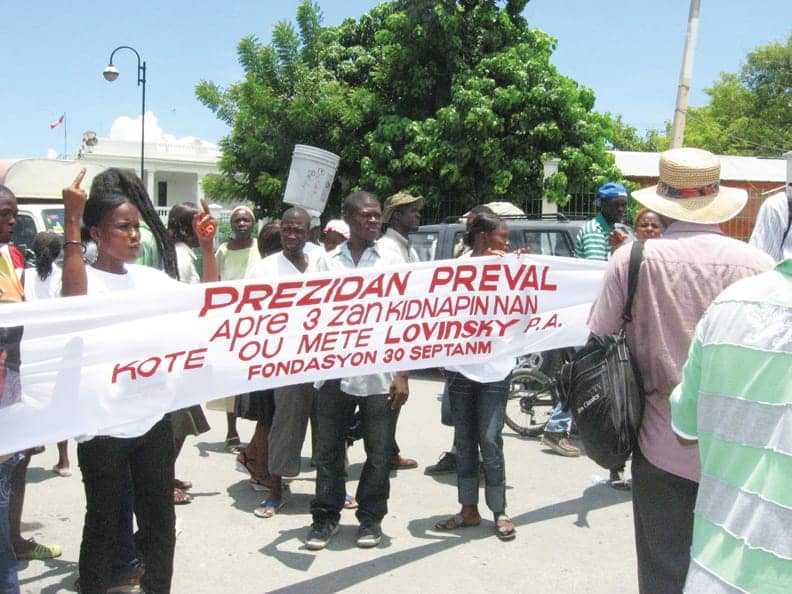
The march commemorating human rights champion Lovinsky Pierre-Antoine, missing for three years now, and the Internally Displaced Persons camp dwellers march come together at the capitol. – Photo: Wanda Sabir
So when things are as dismal as they seem, what can one do? Thanks to more than a few friends who sent money to me for this trip, I was able to leave money with one mother for her son’s university fees for a month and pay for a child’s visit to a private doctor to address a terrible skin rash that was eating him alive – I wired some more money to the child’s family once I got home for the medicine. I left money for another woman’s heart medication. She could only afford two of three prescriptions. I left my tent and sleeping bags for a displaced family.
My friend Kamau Amen Ra is going to sponsor a young woman’s college tuition for four years. Another friend, Makulla Godwin, is purchasing an air mattress for a grandmother who doesn’t have a bed and is finding it hard to sleep on the ground. I also had lots of baby clothes and men and women’s clothes and sturdy and attractive women’s and men’s shoes. My daughter bought children’s toys and coloring books, pipe cleaners, action figures, stickers and miniature cars and another friend sent crayons and felt pens, paper, water color paints, a calligraphy set and lots of paper. I couldn’t carry it all. I also had medical supplies which I had to leave here. As it was, my suitcases were too heavy and I had to take items out, make friends in the screening line and hope no one would enforce the carry-on limit (smile).

The wall around the new school, Sopudep II, is finished and classrooms framed with bamboo are under construction. – Photo: Wanda Sabir
Hopefully the Haitian government will start looking at relocating people to permanent housing. I didn’t see any rebuilding going on anywhere. I wonder where all the Internally Displaced Persons came from and how much, family by family, would it cost to rebuild their homes so they could return to a normal life? Like Habitat for Humanity, if the government allowed multinationals to come in and rebuild, that is, gave land at cost, slowly we could help Haiti rebuild in an economically and environmentally sound way. This would provide jobs to the unemployed and skill development to youth, as we could encourage community development and leadership in the process after the land and the resources were identified.
If several American corporations adopted a region in Haiti hit by the earthquake for this task, it wouldn’t cost as much to actually make this happen – I don’t think. I learned of college professors in San Diego who are paying for afternoon and weekend English language classes for women victims of sexual assault at BAI. In Palo Alto, a class raised $10,000 to help rebuild Rea’s school. College students visited Rea recently this summer to help complete the wall around the new school, which she is getting ready for fall semester. They are working on the temporary bamboo walls now.
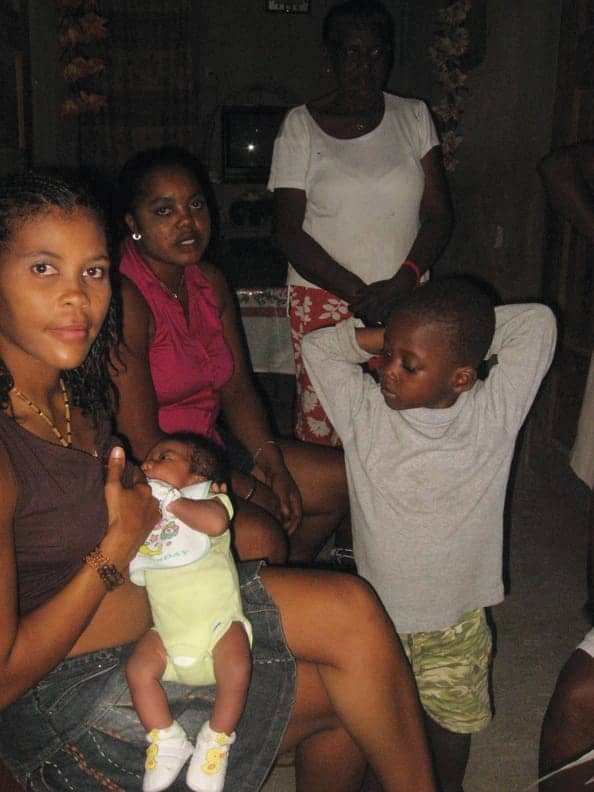
Linda sits with her newborn, Ricarlindo, and her sister-in-law as Rea Dol’s son, Padre, watches the baby. – Photo: Wanda Sabir
She just told me that she started making micro-loans to women and is planning to help more women start businesses. See
http://www.sopudep.org. One woman during the tour talked about Haitian women as the backbone of their nation. I think women are the backbone of any nation – they are the providers and primary nurturers. Men provide protection and when all is working well additional support such as wages and balancing the energy in the home and community. However, throughout the world Black men are being targeted or allowing themselves to be duped and then disillusioned by golden calves which are just gold plated bovine that don’t even produce edible milk.
Rea introduced me to another neighbor, a young couple who’d just had their fourth child, Ricardo and Linda. The husband works for an organization that does youth leadership training throughout Haiti – and his wife is actually a Haitian American citizen, born here and raised in Haiti. It is a difficult tale, which ultimately boils down to America’s biased and racist immigration policies towards Haitian nationals, even those born here, even after the Jan. 12 earthquake. We took by some of the baby clothes I’d brought with me.
That we’re still here – alive and ALIVE … if not as well as we’d like … despite our ancestors’ unwilling transport to this region hundreds of years ago through legal slave trafficking, is encouraging. There is a lot of work and one problem isn’t more important or compelling than another. All the work is necessary whether we’re in Haiti or Dakar or East Oakland. It’s cyclical and similar. The enemy is the same and the fight is the same as well, just more urgent on some fronts than others, like Haiti and New Orleans and the Gulf Region. In the U.S. we have laws that are supposed to prevent such catastrophes as the British Petroleum spill, but how is that possible when people – plant and animal life – are placed second to monetary gain?
I went to a part of Haiti I hadn’t visited before, Kenscoff, located in the mountains near Port au Prince. Jean Yvon Kernizan is working in an afterschool program with young leaders and teachers to get rural development programs off the ground. The world’s interest in Haiti post-earthquake is waning and humanitarians like Kernizan are scrambling to continue programs. He and his wife have opened a restaurant to provide income for the afterschool programs they support.

Wanda enjoys the children of Pou Soléy Leve. – Photo: Wanda Sabir
At Pou Soléy Leve (For a Rising Sun), the kids have agriculture projects where they learn to grow food; they also have a strong art program. The children get a free hot meal daily, which for some is their only meal for the day. When I spoke to the children and asked them about career goals, most of them wanted to be doctors and nurses. I suggested they open a hospital in the community given their shared goals.
Yvon and I were there on a Friday, the Muslim holy day. It was also the first Juma during the Month of Ramadan. On our way down the mountain we run into a Muslim from Senegal on his way to Juma prayer. We give him a lift to the masjid. Yvon was in a rush, so I couldn’t go inside, but next time. I was happy to have seen Muslims the first week of the Blessed Month of Ramadan. Visit http://www.pousoleilleve.org/.
People do not make the world go round and this is why, if we aren’t careful, there will not be a world left to profit from. In the meantime, we can’t wait for the governments to get their stuff together; there is much that can happen under the radar in the midst of chaos, from sponsoring a college student in Haiti and the Dominican Republic – even the U.S. – to providing health care and food to helping get small businesses off the ground with micro lending programs.
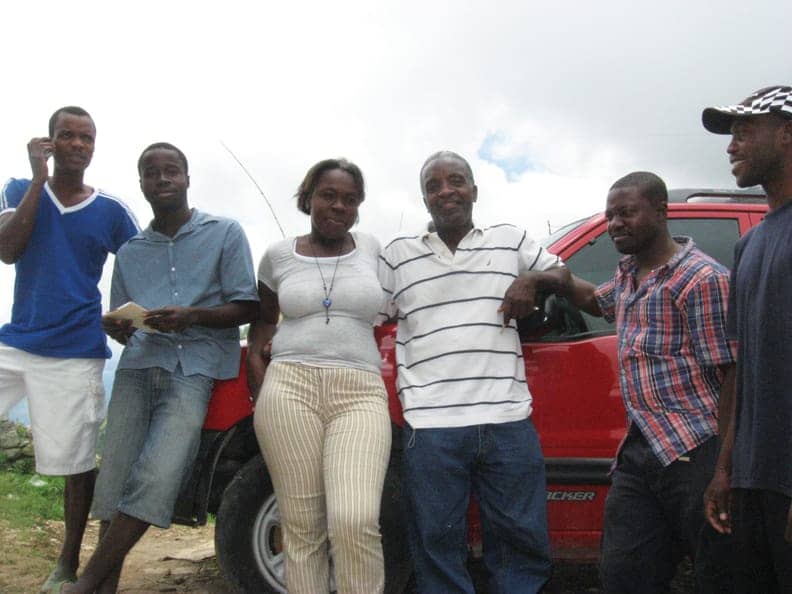
Jean Yvon, center, the director, and teachers at Pou Soley Leve take a break. – Photo: Wanda Sabir
Under the gaze of the great generals Dessalines and Pétion and Christophe sit their people in abject misery. The fountain which once gave respite to the weary traveler and thirsty bird lies fallow filled with scum bordered on all sides by tents and other temporary shelter so tightly packed one can barely walk between them if at all. The largest camp is in the foothills where I believe Rea said there are 30,000 displaced persons, maybe more.
One sees the blue tarps dotting the landscape from afar as we drove through Pétionville, a suburb of Port au Prince, separate from the city itself on the northern hills of the Massif de la Selle. It was named after Alexandre Sabès Pétion (1770–1818), the Haitian general and president later recognized as one of the country’s four founding fathers. The district is primarily a residential and tourist area. Pétionville is part of the city’s metropolitan area, one of the most affluent areas of the city, where the majority of tourist activity takes place, and one of the wealthiest parts of the country. Many diplomats, foreign businessmen, and a large number of wealthy citizens do business and reside within Pétionville, according to Wikipedia. See also http://en.wikipedia.org/wiki/2010_Haiti_earthquake.
I met the former mayor of Pétionvville, Sully Guerrier, in April. He is a civil engineer and, as I mentioned in other writings, is consulting with Rea on the new school site she is building to make sure it is seismically sound. Rea told me that he leased her the property where her first school site resides. The lease is up in 2011 at the former Duvalier regime torture site. Sopudep school’s presence there and its positive impact on the community has been a way to change the karma of the place from negative to positive. See http://www.haitiaction.net/News/HIP/8_8_8/8_8_8.html.
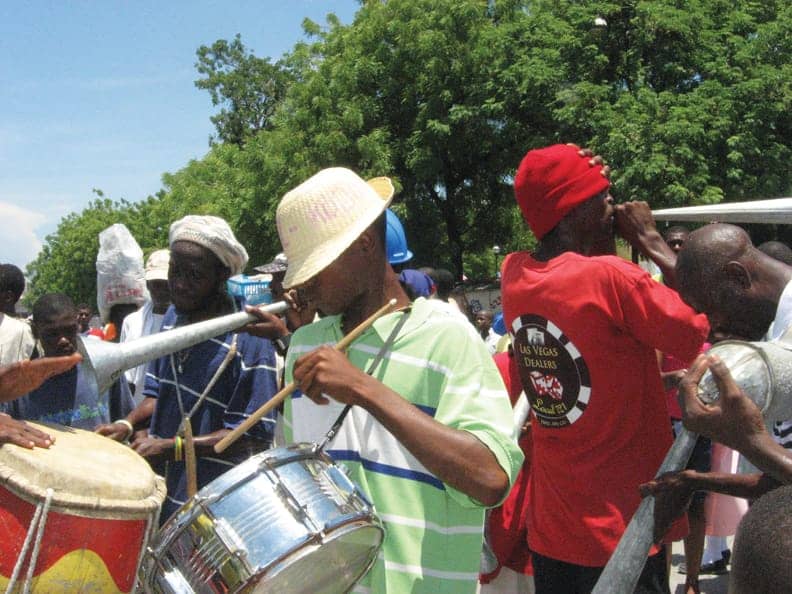
A people’s band keeps spirits high at the Aug. 12 protest march. – Photo: Wanda Sabir
Where is the glory of a nation, the first Black nation, the most celebrated and popularized in the Western Hemisphere – buried under debris? The Jan. 12, 2010, earthquake is not the first earthquake; it’s just the most tangible evidence of the major and minor tremors occurring in this country for the past 200 years – military dictatorships followed by more coup d’états and then U.S. occupation, followed by democratically elected presidents René Préval and Jean-Bertrand Aristide, Aristide kidnapped, exiled and Préval’s banning of Aristide’s Fanmi Lavalas party’s participation in the November 2010 presidential elections. The saga continues with classicism in the camps – one camp’s residents bumping or evicting the residents of another camp – the displaced displacing others who are lower on the food chain hierarchy. This is also what the Aug. 12, 2010, protest was about.
Paul, who was working with Sustainable Organic Integrated Livelihoods (SOIL), a non-profit organization dedicated to protecting soil resources, empowering communities and transforming wastes into resources in Haiti, came by Rea’s home the evening before I left (http://www.oursoil.org). It was good to see him. He is working for the Haitian government overseeing the water sanitation in some of the larger camps. He spoke of the various agencies in charge of water, waste management, food supplies and other areas of concern in the camps. It’s unfortunate that the government agencies are not cross referencing yet. The situation in the camps is dismal all around. It was good though to hear the government hasn’t completely dropped the ball.
I was just musing to myself as I fly home how when I go on vacation it’s to work. I return tired and overwhelmed and jump back into the fast paced day to day movement that is my life and can barely find time to complete all my tasks let alone add new tasks to the ones left to complete as the fall 2010 semester begins. But it is the Honorable Marcus Mosiah Garvey’s birthday and I purposely chose his day to return.
Time doesn’t move any faster or slower … it moves the same.
Last morning in Haiti
On Garvey’s birthday, I wake up at 3 a.m. It’s 5 a.m. now and the barnyard choruses now compete with the early morning crickets and mosquitoes – roosters singing solos, while the dogs carry the bass lines, goats filling in the melody. I like this time of morning. I woke up at 5 a.m. yesterday. It’s time to get ready to go home.
Bay View Arts Editor Wanda Sabir can be reached at wsab1@aol.com. Visit her website at www.wandaspicks.com throughout the month for updates to Wanda’s Picks, her blog, photos and Wanda’s Picks Radio. Her shows are streamed live Wednesdays at 6-7:30 or 8 a.m. and Fridays at 8-10 a.m., can be heard by phone at (347) 237-4610 and are archived on the Afrikan Sistahs’ Media Network.























